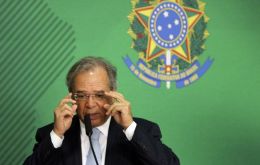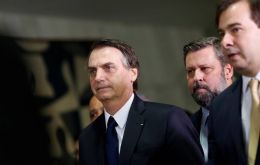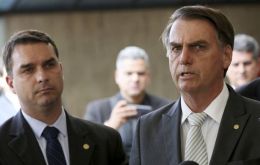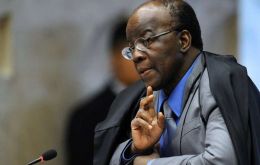MercoPress. South Atlantic News Agency
Tag: Brazilian congress
-
Thursday, April 18th 2019 - 08:22 UTC
Minister says pension reform will pass within four months, helping the Brazilian economy to grow by 3.5%

Brazil's economic growth may accelerate to a 3.5% annual rate in the second half of the year after the approval of pension reforms, Economy Minister Paulo Guedes said in an interview with TV channel Globo news.
-
Thursday, March 28th 2019 - 09:31 UTC
As Bolsonaro's influence wanes, Congress more demanding and minister Guedes ready to resign

Brazilian President Jair Bolsonaro and his economy minister tried to rescue their contentious pension reform bill on Wednesday, as deepening political chaos surrounding the government’s signature proposal slammed Brazilian markets.
-
Thursday, February 21st 2019 - 08:44 UTC
Bolsonaro presents to Congress his pensions overhaul... Where are the necessary votes?

Brazilian President Jair Bolsonaro delivered his proposed pension overhaul to Congress on Wednesday, aiming to save over 1 trillion reais (US$270 billion) in a decade by changing tax rates, delaying retirement and creating individual savings accounts.
-
Friday, February 1st 2019 - 11:10 UTC
Brazil's fiscal deficit in December, a challenge for Bolsonaro and the new Congress

The Brazilian government posted a fiscal deficit of 41.13 billion reais (US$ 11.27 billion) in December, the third widest monthly deficit on record, the central bank said on Thursday. While it was in line with forecasts and amplified by seasonal factors, the shortfall highlights the challenge of exerting tighter control over the country's finances which new President Jair Bolsonaro has said is one of his top priorities.
-
Friday, February 1st 2019 - 10:43 UTC
New Brazilian Congress opens with great challenges, but Bolsonaro has been made vulnerable by Flavio's finances

The real business of governing Brazil starts this Friday for president Jair Messias Bolsonaro with the opening of the new congress through which his ambitious reform program must pass. The former army captain is currently absent from Brasilia will have to follow events from his hospital bed in São Paulo, where he is recovering from a third major operation following his stabbing at a campaign rally last year that almost cost him his life.
-
Wednesday, December 5th 2018 - 09:40 UTC
Will Bolsonaro be able to overcome the traditional “horse trading” of Congress

Traditionally leaders of Brazil have had to offer ministerial posts to allied parties to form a working majority in a Congress that has more than two dozen parties. But following years of corruption scandals that pummeled trust in Brazil’s political establishment, president-elect Jair Bolsonaro has chosen his cabinet ignoring powerful party bosses.
-
Wednesday, November 7th 2018 - 08:51 UTC
Bolsonaro wants pension reform passed before he takes office on January first

Brazil’s right-wing President-elect Jair Bolsonaro said on Tuesday that Congress must make some progress this year on a pension reform proposed by the outgoing government before he takes office on January first.
-
Saturday, October 6th 2018 - 08:33 UTC
Brazilian election: a divided congress but with a powerful decisive “Bullets, Beef and Bible” caucus

All eyes are set on Sunday October 7 presidential election, but Brazilians will also be electing, 27 governors, 54 senators and 513 legislators, and Congress wields considerable power and since 2016 has decided the fate of two presidents: to impeach Dilma Rousseff for juggling with budget numbers and to shield Michel Temer from corruption charges.
-
Wednesday, September 26th 2018 - 08:58 UTC
Evangelical “block” in Brazilian congress expected to increase

Evangelical voters are expected to play a decisive role in Brazil’s Oct. 7 presidential election as new rules ban corporations from making direct contributions in the wake of a graft scandal. With their numbers and clout growing, and the “evangelical bloc” in Congress accounting for 15% of federal lawmakers, evangelical supporters have become the focus of leading candidates.
-
Friday, April 20th 2018 - 09:13 UTC
Brazilian ex Justice and only black member of the high court, considers running for president

Members of the Brazilian Socialist Party (PSB) celebrated on Thursday their newest member, potential presidential candidate and former Supreme Court Justice Joaquim Barbosa, whose debut in a national poll stoked hopes for his potential.
